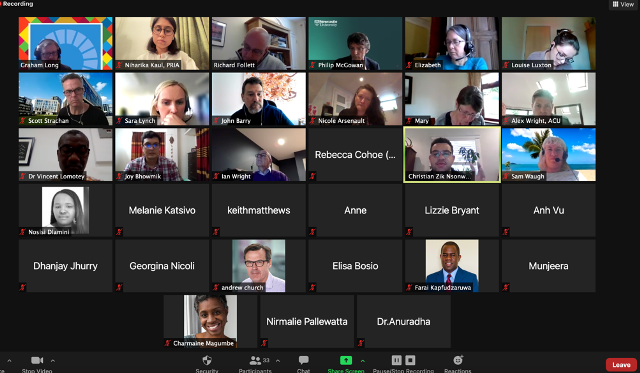Date/Time
Date(s) - 18/05/2021
4:30 pm
Categories No Categories

Niharika Kaul, Research Associate at PRIA and India Coordinator for our UNESCO chair was one of the panelists at this webinar. She discussed how the Knowledge For Change Consortium, an initiative of our Chair is a successful example of how Community University Research Partnerships (CURPs) can be used to achieve locally relevant solutions for issues related to SDGs. She began with two stories of two hubs under the K4C- The Gulu Hub in Northern Uganda and the Raipur Hub in India. She exemplified how the Gulu hub successfully tackled the issue of deforestation in their region by conducting a joint study by the Gulu University, a local CSO and the community. They presented their findings to the local authorities and ultimately deforestation was banned, effective from January 2020. In this way they were able to address SDG 8, 11, 13, and 14 amongst others.
The second story was about the Raipur hub in India, where PRSU Raipur co-produced a research study with women informal workers including MGNREGA workers. They found that Covid-19 had huge gendered impacts on these women, from increased care work, increased domestic violence, lack of income due to loss of jobs for many of these women amongst other challenges. They were therefore able to address SDG 5, 8, 10 amongst other SDGs.
Niharika ended her presentation with a discussion about how core values of knowledge democracy are embedded in the research and capacity building framework of the K4C, which is possible owing to its unique decentralised model through regionally located hubs. She concluded by putting forth 3 major lessons learnt from the work done under the K4C that are relevant for achieving SDGs-
- CURPs are useful for sustainable social and ecological development as they can mobilise the knowledge, skills and assets of both universities and communities.
- Multi-stakeholder approach for sustainable local solutions to global challenges (Solutions lead to shared responsibility and social learning)
- Engagement of HEIs and community partners act as local catalysts that strengthen local action and funding opportunities.
To see the full presentation click here




